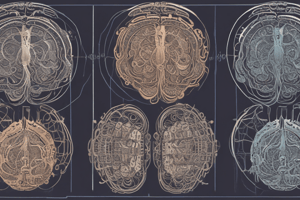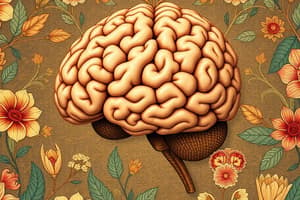Podcast
Questions and Answers
What role does eating play in the body?
What role does eating play in the body?
- Only serves to create pleasure and enjoyment
- Provides energy and materials for growth and repair (correct)
- Has no impact on body temperature regulation
- Eliminates the need for hydration
How do set points in obesity differ from those in temperature regulation?
How do set points in obesity differ from those in temperature regulation?
- They are unchangeable over time
- They are the same as in hunger regulation
- They undergo dramatic and prolonged shifts (correct)
- Set points in obesity shift rapidly
Which group primarily consumes plants?
Which group primarily consumes plants?
- Herbivores (correct)
- Insects
- Carnivores
- Omnivores
What distinguishes omnivores from herbivores and carnivores?
What distinguishes omnivores from herbivores and carnivores?
What aspect of taste sensitivity is mentioned in the content?
What aspect of taste sensitivity is mentioned in the content?
What does incentive theory emphasize as a motivator for behavior?
What does incentive theory emphasize as a motivator for behavior?
Which of the following best describes homeostasis?
Which of the following best describes homeostasis?
What role does the control center play in homeostasis?
What role does the control center play in homeostasis?
How does arousal theory explain human behavior?
How does arousal theory explain human behavior?
In the context of a non-equilibrium state, which component detects an imbalance?
In the context of a non-equilibrium state, which component detects an imbalance?
Which body functions are primarily regulated by homeostasis?
Which body functions are primarily regulated by homeostasis?
Which of the following describes sensory-specific satiety?
Which of the following describes sensory-specific satiety?
What is the primary principle behind learned taste aversion?
What is the primary principle behind learned taste aversion?
How many primary taste sensations are recognized?
How many primary taste sensations are recognized?
What role does Antabus play in relation to learned taste aversion?
What role does Antabus play in relation to learned taste aversion?
What is the primary purpose of sensory-specific satiety in the context of nutrition?
What is the primary purpose of sensory-specific satiety in the context of nutrition?
What provides energy for activity and fuel for maintaining body temperature?
What provides energy for activity and fuel for maintaining body temperature?
How does the 'set point' for hunger differ from that of body temperature?
How does the 'set point' for hunger differ from that of body temperature?
What distinguishes hunger from thirst or temperature regulation?
What distinguishes hunger from thirst or temperature regulation?
What is a key factor that influences the way hunger is experienced compared to temperature?
What is a key factor that influences the way hunger is experienced compared to temperature?
Which statement best describes the balance of nutrient intake related to hunger?
Which statement best describes the balance of nutrient intake related to hunger?
Which theoretical approach suggests that behaviors are automatic and occur in all members of a species?
Which theoretical approach suggests that behaviors are automatic and occur in all members of a species?
What is the primary focus of drive theory in relation to motivation?
What is the primary focus of drive theory in relation to motivation?
In incentive theory, which of the following is a key factor that motivates behavior?
In incentive theory, which of the following is a key factor that motivates behavior?
Arousal theory posits that people behave in ways that help them achieve what?
Arousal theory posits that people behave in ways that help them achieve what?
Which component is NOT part of the homeostasis process?
Which component is NOT part of the homeostasis process?
What initiates a drive according to drive theory?
What initiates a drive according to drive theory?
What is the primary difference between ectothermic and endothermic animals?
What is the primary difference between ectothermic and endothermic animals?
Which process triggers osmotic thirst?
Which process triggers osmotic thirst?
Which structure acts as the body's thermostat?
Which structure acts as the body's thermostat?
What triggers hypovolemic thirst?
What triggers hypovolemic thirst?
How does the body respond to cold conditions?
How does the body respond to cold conditions?
Which brain center contributes to thirst control?
Which brain center contributes to thirst control?
What is a major limitation of research conducted in controlled laboratory settings according to developmental models?
What is a major limitation of research conducted in controlled laboratory settings according to developmental models?
Which of the following is NOT a factor in how food is perceived as a reward?
Which of the following is NOT a factor in how food is perceived as a reward?
How can a parent limit their child's intake of unhealthy foods without making them forbidden?
How can a parent limit their child's intake of unhealthy foods without making them forbidden?
Which statement best describes the role of cognition in the context of food and eating behavior?
Which statement best describes the role of cognition in the context of food and eating behavior?
What psychological factor is highlighted as contributing to poor eating habits?
What psychological factor is highlighted as contributing to poor eating habits?
To what extent is food intake influenced by taste according to critical thinking exercises?
To what extent is food intake influenced by taste according to critical thinking exercises?
Flashcards are hidden until you start studying
Study Notes
Theoretical Approaches to Motivation
- Incentive theory emphasizes external stimuli as motivators; individuals pursue rewards such as food, money, or grades.
- Arousal theory suggests that behavior is aimed at maintaining optimal stimulation levels.
Homeostasis
- Homeostasis refers to the body’s equilibrium, maintaining functions like temperature, fluid levels, and energy reserves.
- A control system is necessary for homeostasis, characterized by a set point to which the system returns after disturbances.
Hunger and Nutrition
- Eating is vital for energy, body temperature regulation, and tissue repair.
- Set point can shift significantly, especially seen in obesity, differing from rapid adjustments like body temperature changes.
- Nutritional variety complicates food choices, influencing when to eat and stop.
Gustation
- Classification of animals based on diet:
- Herbivores consume plants.
- Carnivores eat meat.
- Omnivores eat both plants and animals.
- Humans have five primary taste sensations: sour, sweet, bitter, salty, and umami.
Satiety and Taste Aversion
- Sensory-specific satiety indicates that repeated consumption of a particular food reduces its appeal.
- Learned taste aversion occurs when individuals develop a dislike for foods linked to illness, demonstrated in studies with rats and applications for alcoholics.
Digestive Process
- The digestive system converts food into usable energy and nutrients; understanding its mechanics is crucial for health.
Temperature Regulation
- All animals must maintain internal body temperature for survival:
- Ectothermic animals (e.g., reptiles) cannot self-regulate temperature.
- Endothermic animals (e.g., mammals) use energy to keep temperature constant.
- Temperature control mechanisms include sweating in heat and shivering in cold, regulated by the preoptic area in the hypothalamus.
Thirst Control Signals
- The body consists of 70% water; hydration is critical for survival, with few days without water posing risks.
- Two types of thirst:
- Osmotic thirst arises from cellular fluid loss, often after consuming salty foods.
- Hypovolemic thirst occurs due to decreased blood volume from various causes.
- Key thirst control centers in the hypothalamus include:
- OVLT (organum vasculosum lamina terminalis)
- NST (nucleus of solitary tract)
- SFO (subfornical organ)
Developmental Models and Eating Behavior
- Research environments may lead to results not applicable in natural settings.
- Food can carry various meanings (reward, culture, religion) and impact body image and cognition.
- Parental influence on children's eating habits can shape long-term dietary choices.
Obesity and Delay Gratification
- Impulsivity contributes to poor eating habits and obesity.
- Delay gratification tasks assess self-control related to food intake and eating behavior patterns.
Studying That Suits You
Use AI to generate personalized quizzes and flashcards to suit your learning preferences.




